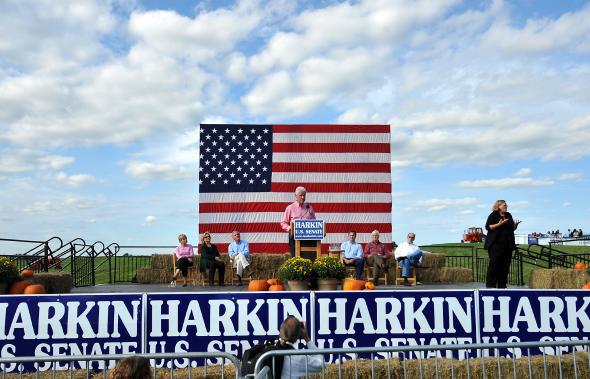There’s handwringing in the heartland. Iowa’s political and chattering classes—and, to a lesser extent, its actual voters—are fretting that their first-in-the-nation nominating contest has lost its luster. Dave Price, the political director for NBC’s affiliate in Des Moines, is the latest to give voice to the angst, writing in this week’s Politico Magazine cover story that there’s a “palpable anxiety in political circles—and even rumblings that Iowa’s king-making days might be over, or at least that the national media, and the rest of the country, will pay less heed this cycle.”
Iowa politicos—like their colleagues in New Hampshire, South Carolina, and Nevada—are a particularly nervous breed. They know better than anyone that their early-nominating status translates directly into political chits and campaign cash for themselves and their state party, and that every minute and dollar a presidential candidate spends elsewhere is one that they aren’t spending in the Hawkeye State. Still, their fears don’t need be altruistic to be accurate.
For Iowans craving the type of caucus clashes that keep candidates and the political press corps camped out in their state for months, there really is reason to worry. Hillary Clinton’s continued polling dominance suggests the Democratic frontrunner will probably be able to keep playing things safe in Iowa, as well as everywhere else. Likewise, GOP establishment favorites like Jeb Bush may decide against slugging it out with more conservative candidates in a nominating contest that is dominated by values voters and tea partiers. As the first-in-the-nation nominating contest, Iowa will still matter, but not as much as it did in decades past.
Such campaign cycle-specific headaches, though, are nothing new in Iowa, particularly among Republicans. “Politically speaking, this state is in something of an existential crisis,” the Washington Post declared at this point in the last presidential cycle, when it appeared as though Mitt Romney had forgotten where Iowa was on the map. Four years before that, the Hawkeye State’s harrumphing was directed at eventual GOP nominee John McCain and his decision to focus the lion’s share of his resources elsewhere, an Iowa-ignoring strategy he had deployed with even greater force in the 2000 cycle.
Iowa’s real reasons to worry, though, go well beyond 2016. Two long-term game-changers loom large on the horizon. The first is the decision by the Republican and Democratic parties to rein in the number of primary debates. By allowing network execs to use national polls to decide who makes it onto the debate stage and who doesn’t, the national parties have effectively created a series of mini-national primaries that will winnow the field long before Iowans have a chance to. The second is the continued rise of super PACs and their dark-money brethren, which have the ability to keep otherwise doomed campaigns afloat far longer than they have any right to be. In primaries past, a poor performance in Iowa or one of the other early-nominating contests would make it mighty difficult for a candidate to raise the type of small-dollar donations he needed to soldier on. That’s no longer the case now that a single deep-pocketed patron can cut a seven- or eight-figure check. Iowa, then, might not have the chance to weed out the presidential pretenders in the field, nor the power to force any contenders from the race.
Iowans, though, have little reason to complain. They might be watching their political influence wane, but they and their fellow early-nominating states are still showered with a disproportionate amount of attention and campaign cash. Clinton may be playing hard to get, but Martin O’Malley and Bernie Sanders have already made more than two dozen visits apiece. Meanwhile, the state still has enough of a Republican draw that Rand Paul—Rand Paul!—felt it necessary to find something to love about its government-subsidized ethanol industry. There is no divine right of kingmakers that will preserve the Iowa Caucus forever, but as long as it remains the first contest on the calendar, it will always get to hold court.
Previously in Slate:
